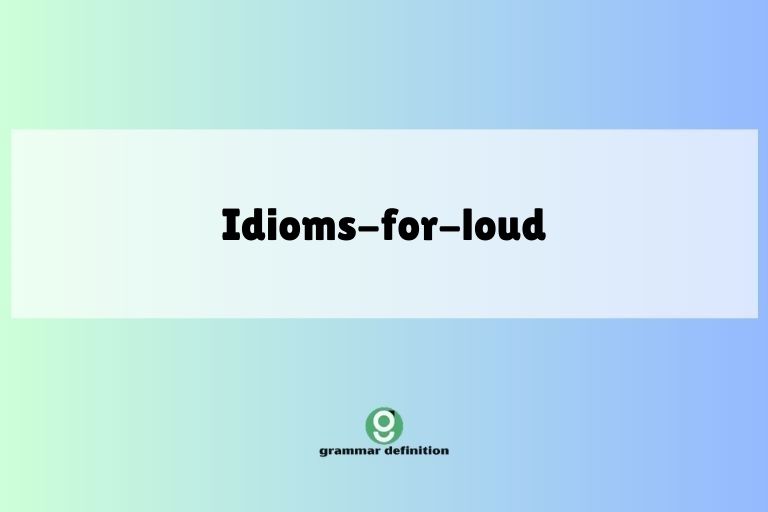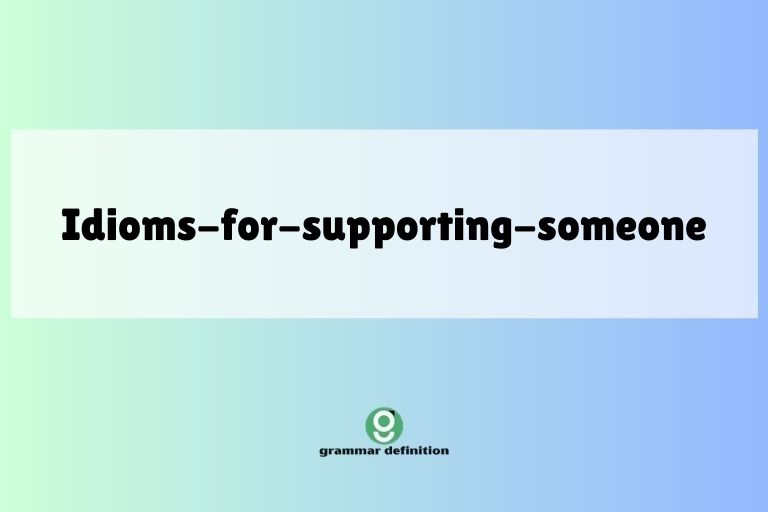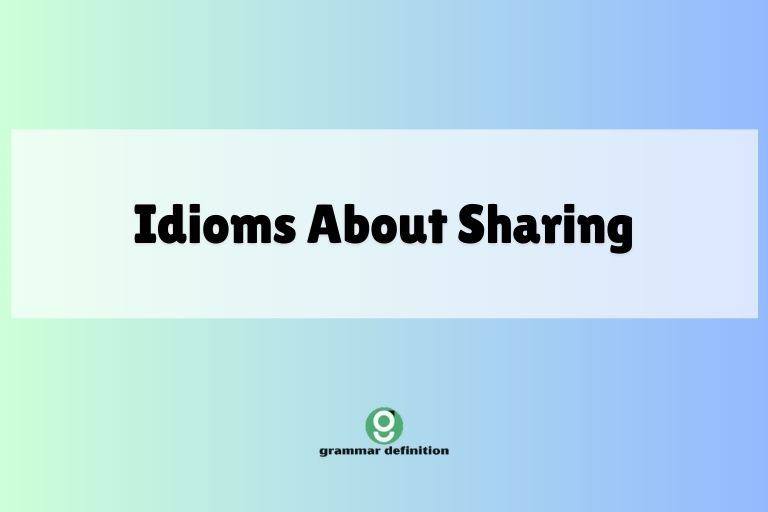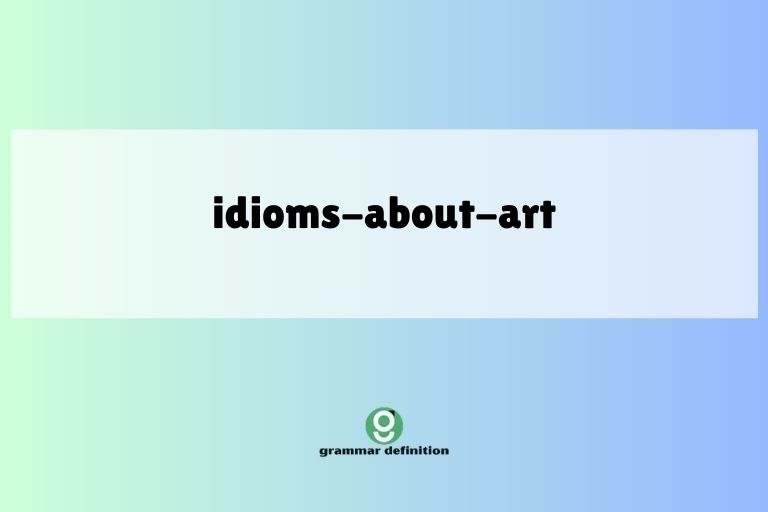Idioms for Loud: Mastering Expressive English

Understanding idioms is crucial for mastering the nuances of the English language. Idioms add color and depth to our communication, making our speech and writing more engaging and relatable.
This article focuses specifically on idioms related to loudness, helping you understand how to express varying degrees of noisiness in creative and effective ways. Whether you’re an ESL learner or a native speaker looking to enrich your vocabulary, this guide will provide you with the knowledge and practice you need to confidently use idioms for ‘loud’ in your everyday conversations.
This article is for anyone looking to enhance their English vocabulary and improve their communication skills. By the end of this guide, you’ll be able to recognize and use a variety of idioms related to loudness, making your English sound more natural and expressive.
Table of Contents
- Definition of Idioms for Loud
- Structural Breakdown of Idioms
- Types and Categories of Idioms for Loud
- Examples of Idioms for Loud
- Usage Rules for Idioms
- Common Mistakes When Using Idioms
- Practice Exercises
- Advanced Topics: Nuances and Connotations
- Frequently Asked Questions
- Conclusion
Definition of Idioms for Loud
An idiom is a phrase or expression whose meaning cannot be understood from the literal meanings of its individual words. Instead, the phrase has a figurative meaning that is known through common usage.
Idioms related to ‘loud’ are phrases that describe sounds or voices that are intense, noisy, or boisterous. These idioms often use metaphorical language to paint a vivid picture of the sound being described.
These idioms can be classified based on the intensity and type of the sound. For instance, some idioms describe a sudden, sharp noise, while others describe a continuous, overwhelming sound.
Understanding these nuances is critical for using idioms correctly and effectively.
The function of idioms for ‘loud’ is to provide a more expressive and descriptive way to convey the intensity and character of sound. They go beyond simply stating that something is loud; they add color, emotion, and context to the description.
Structural Breakdown of Idioms
Idioms, unlike standard grammatical structures, do not follow regular syntactic rules. They are fixed expressions, meaning the words and their order cannot be altered without changing or losing the idiom’s meaning.
The structure of idioms for ‘loud’ often involves:
- Verbs and Adverbs: Many idioms use verbs like “roar,” “thunder,” or “boom” combined with adverbs or prepositions to emphasize the intensity of the sound. For example, “roar like a lion.”
- Similes: Some idioms use similes, comparing the sound to something else that is known for being loud. For instance, “as loud as a thunderclap.”
- Metaphors: Metaphors are also common, where a sound is described using a word or phrase that is not literally applicable. For example, “a deafening silence” (ironically).
Understanding these structural elements helps in recognizing and interpreting idioms correctly. While the individual words might make sense, the overall meaning is figurative and must be learned as a unit.
Types and Categories of Idioms for Loud
Idioms for ‘loud’ can be categorized based on the type of sound they describe and the level of intensity they convey. Here are some common categories:
1. Sudden and Sharp Sounds
These idioms describe sounds that are abrupt and piercing, often startling or alarming.
2. Continuous and Overwhelming Sounds
These idioms describe sounds that are sustained and intense, often creating a sense of chaos or disruption.
3. Boisterous and Energetic Sounds
These idioms describe sounds that are lively and enthusiastic, often associated with celebrations or large gatherings.
4. Angry and Aggressive Sounds
These idioms describe sounds that are forceful and threatening, often conveying anger or hostility.
5. Exaggerated and Dramatic Sounds
These idioms describe sounds that are amplified for effect, often used in storytelling or humorous contexts.
Examples of Idioms for Loud
Here are some examples of idioms for ‘loud’, categorized by their type, along with their meanings and example sentences.
Table 1: Idioms for Sudden and Sharp Sounds
This table provides examples of idioms used to describe sudden and sharp sounds, giving you a better understanding of how to use them effectively.
| Idiom | Meaning | Example Sentence |
|---|---|---|
| As loud as a thunderclap | Extremely loud and sudden. | The explosion was as loud as a thunderclap, shaking the entire neighborhood. |
| A piercing shriek | A high-pitched and intense scream. | A piercing shriek echoed through the dark alley, sending chills down my spine. |
| A deafening bang | An extremely loud, explosive sound. | The door slammed shut with a deafening bang, startling everyone in the room. |
| Crack like a whip | A sharp, snapping sound. | The sound of the fire crackling like a whip filled the cozy cabin. |
| Pop like a balloon | A sudden, bursting sound. | The tire popped like a balloon when it ran over the sharp nail. |
| A sudden roar | A loud, deep, prolonged sound. | A sudden roar from the crowd erupted as the home team scored. |
| A sharp clap | A quick, loud sound made by striking two surfaces together. | A sharp clap of thunder startled the sleeping dog. |
| A shattering crash | The loud noise of something breaking violently. | The shattering crash of glass woke everyone in the house. |
| Screech to a halt | To stop very suddenly, making a loud, high-pitched noise. | The car screeched to a halt just inches from the pedestrian. |
| Burst out laughing | To suddenly start laughing loudly. | She burst out laughing at his silly joke. |
| A piercing whistle | A high-pitched, sharp sound made by whistling. | The referee blew a piercing whistle to signal the end of the game. |
| A jarring clang | A loud, harsh, metallic sound. | The garbage can lid fell with a jarring clang. |
| A blaring siren | A loud, wailing sound used as a warning. | The blaring siren of the ambulance could be heard from blocks away. |
| A booming voice | A deep, resonant, and loud voice. | The actor’s booming voice filled the theater. |
| A resounding echo | A loud, clear echo that repeats a sound. | The shout produced a resounding echo in the mountain valley. |
| A strident tone | A harsh, grating, and loud tone. | The politician spoke in a strident tone, trying to dominate the debate. |
| A shrill cry | A high-pitched, piercing cry. | A shrill cry of seagulls filled the air at the beach. |
| A deafening explosion | An extremely loud explosion. | The special effects included a deafening explosion on stage. |
| A thunderous applause | Very loud and enthusiastic applause. | The audience gave a thunderous applause after the performance. |
| A piercing scream | A high-pitched, very loud scream. | She let out a piercing scream when she saw the spider. |
| A staccato burst | A series of short, sharp sounds. | The machine gun fired in a staccato burst. |
| A sharp intake of breath | A sudden, audible gasp. | There was a sharp intake of breath when the magician revealed his trick. |
| A sudden shout | A loud, sudden cry. | A sudden shout from the crowd startled everyone. |
| A cracking sound | A sharp, splitting noise. | We heard a cracking sound as the tree branch broke. |
| A thunderous crack | A loud, explosive cracking noise. | A thunderous crack split the night sky during the storm. |
Table 2: Idioms for Continuous and Overwhelming Sounds
This table presents idioms used to describe sounds that are sustained and intense, offering insights into how to use these expressions accurately.
| Idiom | Meaning | Example Sentence |
|---|---|---|
| Din of the city | A loud, unpleasant, and prolonged noise. | I couldn’t sleep because of the din of the city outside my window. |
| A constant drone | A continuous, monotonous humming sound. | The constant drone of the air conditioner was almost hypnotic. |
| A cacophony of sounds | A harsh, discordant mixture of sounds. | The street market was a cacophony of sounds, from vendors shouting to music playing. |
| A never-ending racket | A loud, disturbing noise that continues for a long time. | The construction site next door created a never-ending racket. |
| The hum of activity | A continuous, low sound indicating busy activity. | The office was filled with the hum of activity as everyone worked on their projects. |
| A constant barrage of noise | A continuous, overwhelming stream of noise. | Living near the airport meant enduring a constant barrage of noise from the planes. |
| A deafening roar | An extremely loud, continuous noise. | The crowd erupted in a deafening roar when the team won the championship. |
| A persistent hum | A continuous, low-frequency sound that is often irritating. | There was a persistent hum coming from the old refrigerator. |
| The buzz of conversation | A low, continuous murmur of many people talking. | The restaurant was filled with the buzz of conversation. |
| A wall of sound | A continuous, overwhelming noise that seems to surround you. | The concert began with a wall of sound that shook the entire venue. |
| An incessant clamor | A loud and confused noise, especially that of people shouting vehemently. | An incessant clamor arose from the protesters in the street. |
| A continuous rumble | A low, heavy, continuous sound. | We could hear a continuous rumble from the distant train. |
| A steady thrum | A continuous, rhythmic humming sound. | The steady thrum of the engine lulled her to sleep. |
| A constant chatter | Continuous rapid and informal talk. | The students engaged in constant chatter before the class started. |
| A rolling thunder | A deep, rumbling sound of thunder that continues for a long time. | We listened to the rolling thunder during the storm. |
| A sustained bellow | A loud, prolonged shout or roar. | The coach let out a sustained bellow at his team. |
| The white noise | A background noise that masks other sounds. | The white noise helped me concentrate while studying. |
| A persistent drone | A continuous humming or buzzing sound. | The persistent drone of the fluorescent lights was distracting. |
| A constant blare | A loud, continuous, harsh sound. | The music was a constant blare from the open windows. |
| A continuous wail | A prolonged, high-pitched cry of pain, grief, or alarm. | We could hear a continuous wail of sirens in the distance. |
| A constant drone | A continuous, monotonous humming sound. | The constant drone of the air conditioner was almost hypnotic. |
| A cacophony of sounds | A harsh, discordant mixture of sounds. | The street market was a cacophony of sounds, from vendors shouting to music playing. |
| A never-ending racket | A loud, disturbing noise that continues for a long time. | The construction site next door created a never-ending racket. |
| The hum of activity | A continuous, low sound indicating busy activity. | The office was filled with the hum of activity as everyone worked on their projects. |
| A constant barrage of noise | A continuous, overwhelming stream of noise. | Living near the airport meant enduring a constant barrage of noise from the planes. |
Table 3: Idioms for Boisterous and Energetic Sounds
This table illustrates idioms used to describe lively and enthusiastic sounds, aiding you in understanding their application in different contexts.
| Idiom | Meaning | Example Sentence |
|---|---|---|
| A raucous cheer | A loud, rough, and rowdy cheer. | The crowd erupted in a raucous cheer after the winning goal. |
| A boisterous laugh | A loud, energetic, and cheerful laugh. | His boisterous laugh filled the room, making everyone smile. |
| A lively chorus | A spirited and energetic group singing together. | The choir performed a lively chorus that had everyone clapping. |
| A jubilant shout | A loud, joyful shout expressing triumph or celebration. | A jubilant shout went up as the marathon runner crossed the finish line. |
| A hearty guffaw | A loud, unrestrained burst of laughter. | He let out a hearty guffaw at the comedian’s joke. |
| A spirited chant | A loud, enthusiastic repetition of a word or phrase. | The fans broke into a spirited chant to support their team. |
| A riotous celebration | A noisy, uncontrolled, and joyful celebration. | The town held a riotous celebration after the local team won the championship. |
| A thunderous ovation | A loud and enthusiastic round of applause. | The actor received a thunderous ovation after his performance. |
| Sing at the top of one’s lungs | To sing very loudly. | They sang at the top of their lungs during the concert. |
| Let out a whoop | To give a loud, excited shout. | She let out a whoop of joy when she heard the good news. |
| A rousing cheer | A loud, enthusiastic cheer that inspires excitement. | The team was greeted with a rousing cheer as they took the field. |
| A boisterous applause | Loud and energetic clapping. | The audience gave a boisterous applause to the performers. |
| A merry din | A cheerful, noisy atmosphere. | The holiday party created a merry din that lasted all night. |
| A festive clamor | A joyful and noisy commotion. | The streets were filled with a festive clamor during the parade. |
| A vivacious hoot | A lively and spirited shout or laugh. | Her vivacious hoot was infectious, making everyone laugh. |
| A jolly uproar | A cheerful and boisterous commotion. | The children created a jolly uproar during the birthday party. |
| A rollicking song | A lively and cheerful song. | They sang a rollicking song that got everyone dancing. |
| A festive racket | A cheerful and noisy disturbance. | The party created a festive racket that could be heard down the street. |
| A spirited shout | A loud, enthusiastic cry. | A spirited shout went up from the crowd as the runner crossed the finish line. |
| A hearty cheer | A loud, enthusiastic expression of approval. | The team received a hearty cheer from their supporters. |
| A raucous celebration | A wild, noisy, and unrestrained party. | The victory was followed by a raucous celebration that lasted all night. |
| A festive atmosphere | A cheerful and lively environment. | The town square had a festive atmosphere during the holidays. |
| A jubilant mood | A feeling of great happiness and triumph. | There was a jubilant mood in the locker room after the win. |
| A thunderous cheer | A very loud and enthusiastic cheer. | The crowd let out a thunderous cheer as the band took the stage. |
| A lively atmosphere | A vibrant and energetic environment. | The restaurant had a lively atmosphere on Saturday night. |
Table 4: Idioms for Angry and Aggressive Sounds
This table provides idioms that describe sounds conveying anger or aggression, helping you understand their use in expressing strong emotions.
| Idiom | Meaning | Example Sentence |
|---|---|---|
| A furious bellow | A loud, angry shout. | The coach let out a furious bellow at the referee. |
| A scathing rebuke | A harsh and critical reprimand. | The boss delivered a scathing rebuke to the employee for his mistake. |
| A tirade of abuse | A long, angry speech filled with insults. | The driver unleashed a tirade of abuse at the other motorist after the accident. |
| A venomous hiss | A low, angry sound, like that of a snake. | She responded with a venomous hiss when accused of lying. |
| A growl of anger | A low, guttural sound expressing displeasure. | He let out a growl of anger when he realized he had been cheated. |
| A barrage of insults | A rapid and overwhelming series of offensive remarks. | The politician faced a barrage of insults from the opposition. |
| A thunderous reprimand | A loud and forceful scolding. | The teacher gave the student a thunderous reprimand for misbehaving. |
| A scathing remark | A critical and hurtful comment. | Her scathing remark left him speechless. |
| Roar with anger | To shout loudly in anger. | He roared with anger when he saw the damage to his car. |
| A violent outburst | A sudden and uncontrolled expression of anger. | His violent outburst shocked everyone in the room. |
| A heated argument | A loud and passionate disagreement. | We could hear a heated argument coming from next door. |
| A fierce denunciation | A strong public condemnation. | The senator delivered a fierce denunciation of the proposed law. |
| A strident accusation | A harsh and forceful charge of wrongdoing. | She made a strident accusation against her opponent. |
| A bitter tirade | A long, angry, and critical speech. | He launched into a bitter tirade about the state of the world. |
| A furious outburst | A sudden, violent expression of anger. | She had a furious outburst when she discovered the betrayal. |
| A scathing criticism | Harsh and severe disapproval. | The film received scathing criticism from the reviewers. |
| A vehement protest | A strong and passionate objection. | The citizens staged a vehement protest against the new policy. |
| A thunderous objection | A loud and forceful expression of disagreement. | There was a thunderous objection when the proposal was announced. |
| A strident tone | A harsh, grating, and loud tone. | The politician spoke in a strident tone, trying to dominate the debate. |
| A furious rant | A long, angry, and uncontrolled speech. | He went on a furious rant about the unfairness of the system. |
| A venomous attack | A harsh and malicious verbal assault. | The article was a venomous attack on the politician’s character. |
| A bitter complaint | An expression of dissatisfaction or resentment. | She lodged a bitter complaint about the poor service. |
| A tirade of insults | A series of offensive and abusive remarks. | The hockey game ended in a tirade of insults between the players. |
| A scathing assessment | A harsh and critical evaluation. | The report provided a scathing assessment of the company’s performance. |
| A furious rebuke | A sharp and stern disapproval. | The manager issued a furious rebuke after the project failed. |
Table 5: Idioms for Exaggerated and Dramatic Sounds
This table showcases idioms used to amplify sounds for dramatic or humorous effect, helping you understand how to use them in storytelling and creative writing.
| Idiom | Meaning | Example Sentence |
|---|---|---|
| Loud enough to wake the dead | Extremely loud. | The music was so loud it was enough to wake the dead. |
| Shout from the rooftops | To proclaim something loudly and publicly. | I wanted to shout from the rooftops when I got the job offer. |
| Cry one’s eyes out | To cry very loudly and intensely. | She cried her eyes out after watching the sad movie. |
| Scream bloody murder | To scream very loudly, usually in fear or anger. | He screamed bloody murder when he saw the spider. |
| Yell blue murder | To complain or protest very loudly. | The customers yelled blue murder when the store ran out of the advertised item. |
| Make a mountain out of a molehill | To exaggerate the importance of something trivial. | Don’t make a mountain out of a molehill; it’s just a small mistake. |
| Raise hell | To cause a disturbance or create chaos. | The protesters threatened to raise hell if their demands weren’t met. |
| Go ballistic | To become extremely angry and irrational. | My dad went ballistic when he saw the dent in his car. |
| Rattle the windows | To make a loud noise that shakes the windows. | The bass from the party next door was rattling the windows. |
| Deafening silence | An extremely noticeable absence of sound. | After his outburst, there was a deafening silence in the room. |
| Echo through the ages | To resonate or be remembered for a very long time. | His words of wisdom will echo through the ages. |
| Shout it from the mountaintops | To proclaim something publicly and enthusiastically. | They were so proud of their son’s achievements, they wanted to shout it from the mountaintops. |
| Cry a river | To cry excessively or dramatically. | Don’t cry a river over a small setback; you’ll get through it. |
| Scream blue murder | To complain loudly and vehemently. | The passengers screamed blue murder when the flight was delayed. |
| Make a scene | To create a public disturbance or embarrassing situation. | He made a scene in the restaurant when they got his order wrong. |
| Raise a stink | To complain loudly and forcefully. | The neighbors raised a stink about the noise from the construction site. |
| Go through the roof | To become extremely angry or excited. | The prices went through the roof during the holiday season. |
| Shake the foundations | To cause significant disruption or upheaval. | The scandal shook the foundations of the company. |
| A piercing shriek | A high-pitched and intense scream. | A piercing shriek echoed through the dark alley, sending chills down my spine. |
| A deafening bang | An extremely loud, explosive sound. | The door slammed shut with a deafening bang, startling everyone in the room. |
| A sudden roar | A loud, deep, prolonged sound. | A sudden roar from the crowd erupted as the home team scored. |
| A shattering crash | The loud noise of something breaking violently. | The shattering crash of glass woke everyone in the house. |
| Burst out laughing | To suddenly start laughing loudly. | She burst out laughing at his silly joke. |
| A blaring siren | A loud, wailing sound used as a warning. | The blaring siren of the ambulance could be heard from blocks away. |
| A booming voice | A deep, resonant, and loud voice. | The actor’s booming voice filled the theater. |
Usage Rules for Idioms
Using idioms correctly requires understanding their specific context and connotations. Here are some important usage rules:
- Context is Key: Idioms are often specific to certain situations or types of communication. Using an idiom in an inappropriate context can sound awkward or confusing.
- Figurative Meaning: Always remember that idioms have a figurative meaning, not a literal one. Don’t try to interpret the individual words literally.
- Fixed Expressions: Idioms are generally fixed expressions, meaning you can’t change the words or their order. Altering an idiom can destroy its meaning.
- Audience Awareness: Be mindful of your audience. Some idioms may not be familiar to non-native speakers or people from different cultural backgrounds.
For example, using “loud enough to wake the dead” in a formal business presentation would be inappropriate. It’s better suited for casual conversation or storytelling.
Common Mistakes When Using Idioms
One of the most common mistakes is interpreting idioms literally. For example, someone might misunderstand “shout from the rooftops” as physically shouting from a roof, rather than proclaiming something publicly.
Another common mistake is altering the words of an idiom. For instance, saying “scream red murder” instead of “scream bloody murder” changes the idiom and makes it nonsensical.
Correct: The music was loud enough to wake the dead.
Incorrect: The music was loud enough to wake the living.
Correct: He screamed bloody murder when he saw the spider.
Incorrect: He screamed red murder when he saw the spider.
Practice Exercises
Test your understanding of idioms for ‘loud’ with these exercises. Fill in the blanks with the correct idiom from the list provided.
Exercise 1
Choose the correct idiom from the list below to complete the sentences.
Idiom List: as loud as a thunderclap, din of the city, burst out laughing, furious bellow, shout from the rooftops
| Question | Answer |
|---|---|
| 1. The explosion was __________ , shaking the entire neighborhood. | as loud as a thunderclap |
| 2. I couldn’t sleep because of the __________ outside my window. | din of the city |
| 3. She __________ at his silly joke. | burst out laughing |
| 4. The coach let out a __________ at the referee. | furious bellow |
| 5. I wanted to __________ when I got the job offer. | shout from the rooftops |
| 6. The door slammed shut with a __________ , startling everyone in the room. | as loud as a thunderclap |
| 7. The constant __________ made it hard to concentrate. | din of the city |
| 8. When she heard the news, she couldn’t help but __________ . | burst out laughing |
| 9. His __________ echoed through the stadium. | furious bellow |
| 10. They were so proud, they wanted to __________ . | shout from the rooftops |
Exercise 2
Match the idiom with its meaning.
| Idiom | Meaning |
|---|---|
| 1. A deafening roar | A. A loud, unpleasant, and prolonged noise. |
| 2. Din of the city | B. A loud, energetic, and cheerful laugh. |
| 3. A boisterous laugh | C. To sing very loudly. |
| 4. Sing at the top of one’s lungs | D. An extremely loud, continuous noise. |
| 5. Raise hell | E. To cause a disturbance or create chaos. |
Answers: 1-D, 2-A, 3-B, 4-C, 5-E
Exercise 3
Rewrite the following sentences using idioms for ‘loud’.
| Original Sentence | Rewritten Sentence (using idioms) |
|---|---|
| 1. The music was very loud. | The music was loud enough to wake the dead. |
| 2. He shouted angrily. | He roared with anger. |
| 3. The city was very noisy. | The din of the city was overwhelming. |
| 4. She laughed loudly. | She burst out laughing. |
| 5. The applause was very enthusiastic. | The audience gave a thunderous ovation. |
| 6. The thunder was extremely loud. | The thunder was as loud as a thunderclap. |
| 7. He complained very loudly. | He yelled blue murder. |
| 8. The baby cried intensely. | The baby cried his eyes out. |
| 9. The siren was very loud and harsh. | The blaring siren could be heard for miles. |
| 10. The argument was very heated. | The argument was loud enough to raise hell. |
Advanced Topics: Nuances and Connotations
Understanding the subtle differences in meaning and the emotional associations (connotations) of idioms is essential for advanced usage. For example, “a raucous cheer” implies a boisterous, somewhat unrefined enthusiasm, while “a thunderous ovation” suggests a more formal and respectful appreciation.
- Formal vs. Informal: Some idioms are more appropriate for formal settings, while others are better suited for informal conversations.
- Emotional Tone: Idioms can convey different emotions, such as anger, joy, or fear. Choose idioms that match the intended emotional tone of your message.
- Cultural Context: Be aware that some idioms may have different connotations or be more common in certain cultures or regions.
For example, “raise hell” is an informal idiom that implies causing trouble or making a loud protest. It would be inappropriate in a formal business setting but perfectly acceptable in a casual conversation among friends.
Frequently Asked Questions
What is the difference between an idiom and a simile?
An idiom is a phrase whose meaning is different from the literal meanings of its individual words, while a simile is a comparison between two things using “like” or “as.”
How can I improve my understanding of idioms?
Read widely, listen to native speakers, and pay attention to how idioms are used in context. Practice using idioms in your own speech and writing.
Are idioms universal across all English-speaking countries?
No, some idioms are specific to certain regions or countries. Be aware of regional variations and use idioms that are appropriate for your audience.
Is it okay to mix idioms from different categories in one sentence?
While it’s technically possible, it can sound awkward if not done carefully. Ensure that the idioms fit together logically and maintain a consistent tone.
How do I know when to use an idiom instead of a more straightforward expression?
Use idioms when you want to add color, emotion, or emphasis to your communication. However, be mindful of your audience and the context of the situation.
Conclusion
Mastering idioms for ‘loud’ can significantly enhance your English communication skills, allowing you to express varying degrees of noisiness in vivid and engaging ways. By understanding the definitions, structural breakdown, types, usage rules, and common mistakes associated with these idioms, you can confidently incorporate them into your everyday conversations and writing.
Remember to practice regularly and be mindful of the context and audience to use idioms effectively. Keep exploring and expanding your vocabulary to become a more expressive and fluent English speaker.






